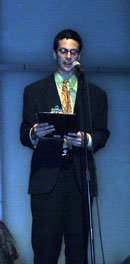 and
a particular welcome to Robert Merrill, who showed up with his
and
a particular welcome to Robert Merrill, who showed up with his
Yesterday we drove into New York to the Jewish Museum. We saw their special exhibition, "Voice, Image and Gesture," selected items from their main collection set off with sound and video compiled and selected by Andy, that made the show one of New York’s current hot items. Our main purpose, though, was as to attend Bel Canto(r): Jewish Superstars of Song—yet another Andrew M. Ingall son et lumière attraction at The Jewish Museum. Following on last year’s theme of Viva La Diva , this year was devoted to the exploration of Jewish singers who left the pulpit for the opera stage. The focus was on three Jewish boys, two from Brooklyn, one from the Lower East Side: Jan Peerce (né Pincus Perelmuth), Richard Tucker (né Rubin Ticker), and Robert Merrill (né Moishe Miller).
Andy began with a welcome to all,  and
a particular welcome to Robert Merrill, who showed up with his
and
a particular welcome to Robert Merrill, who showed up with his
extended family, 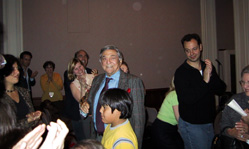 to the warm applause of all. Merrill is in his 80’s now, with a beautiful
thick salt-and-pepper thick rug on his head, the same winning good looks
and smile.
to the warm applause of all. Merrill is in his 80’s now, with a beautiful
thick salt-and-pepper thick rug on his head, the same winning good looks
and smile. 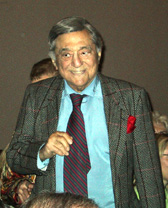 While some say he is given to "senior moments" now and then, he seemed
to understand everything that was happening, and to be thrilled to be the
object of adoration. The families of the late Tucker and Peerce were also
presented in several rows of reserved seats. Andy then introduced the first
speaker, Ira Siff, an opera critic, impresario, and diva, who is the director
of the all-male La Grand Scena Opera Company of New York, and who is also
its leading diva in his alternative persona: Vera Galupe-Borschkh. This
man gave one of the best talks about anything that I’ve ever heard. He
was engaging, funny, heartwarming, conveying to and infecting the audience
with his pervasive love of opera. He spoke of his mother levitating into
the air, a loaf of rye bread under her arm, as she left a Brooklyn bakery,
sighing, "He was in the there…Robert Merrill." He went on to say, that
his mother was proud of both her children, his brother who became a doctor,
and him, who became a diva.
While some say he is given to "senior moments" now and then, he seemed
to understand everything that was happening, and to be thrilled to be the
object of adoration. The families of the late Tucker and Peerce were also
presented in several rows of reserved seats. Andy then introduced the first
speaker, Ira Siff, an opera critic, impresario, and diva, who is the director
of the all-male La Grand Scena Opera Company of New York, and who is also
its leading diva in his alternative persona: Vera Galupe-Borschkh. This
man gave one of the best talks about anything that I’ve ever heard. He
was engaging, funny, heartwarming, conveying to and infecting the audience
with his pervasive love of opera. He spoke of his mother levitating into
the air, a loaf of rye bread under her arm, as she left a Brooklyn bakery,
sighing, "He was in the there…Robert Merrill." He went on to say, that
his mother was proud of both her children, his brother who became a doctor,
and him, who became a diva.
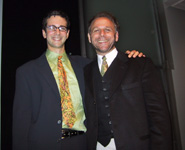
There followed the showing of a video compiled by Andy from the treasure trove of The Jewish Museum’s media archives, of the three singers performing being interviewed on television by Edward R. Murrow, Martin Bookspan, and Isaac Stern. The choice of material, as well as the skillful editing by Allesandro Cavadini made for a masterpiece that blew everyone away.
Then, there was a panel discussion chaired by Andy, with Mark Slobin, an ethnomusicologist from Wesleyan; Martin Bookspan, an announcer, interviewer, critic, and commentator; and Robert Abelson, the cantor of Temple Israel in New York, who left the opera stage for the pulpit. Each participant brought his own perspective to bear, with admixtures of humor, scholarship, historical perspective, and authority. All right, so I’m a little prejudiced, but there was our son, a late bloomer who has become a garden of wonders, conceptualizing the program, putting together the videotape, choosing the panelists so astutely, and moderating a discussion among these heavy hitters, and introducing my vocal idol, Robert Merrill. Such naches is beyond my wildest dreams.
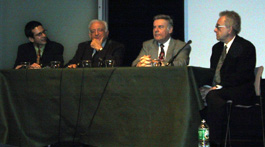
Some of the snatches of conversation included:
Abelson (who has the same good looks, but more humanity, humility, and wit than Merrill): "We all changed our names. It was just what you did at the time. Everybody did it. Jews and non-Jews, when you were in showbusiness, you changed your name."
Abelson: "Of course, all cantors think they could have been opera stars. They say, ‘Sure, I could have been an opera star…but that wasn’t for me…I gave my voice to God.’"
Bookspan (who, despite his Boston accent, has an announcer’s sonorous voice and clipped diction): "What’s it like today for the arts on television? It’s terrible. The NBC Symphony…a symphony orchestra created by and for a network, with Toscanini as its conductor…is no more. But the program that provides me with the greatest percentage of my income…The Guiding Light, …for which I am the announcer, has endured for 35 years."
Afterward, the crowd mingled, offering congratulations, asking for autographs. In attendance were Nancy and Joel, Marjorie and Jonathan, Elaine and Marty Hoffman, Neal’s parents, Tracy, Neal’s sister, and of course, Neal himself, beaming with pride.
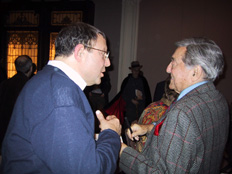 ."You
are the greatest baritone I ever heard."
."You
are the greatest baritone I ever heard."
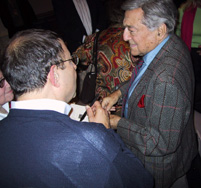 ."Would
you please write 'A Michele, gran tenore?'"
."Would
you please write 'A Michele, gran tenore?'"
.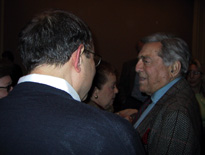 ."I
will not!'"
."I
will not!'"
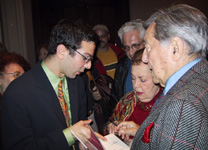 "You
see, The Queen's Throat is not just about opera...it's about a young
man's struggle with being gay and Jewish, and loving Wagner, as well."
"You
see, The Queen's Throat is not just about opera...it's about a young
man's struggle with being gay and Jewish, and loving Wagner, as well."
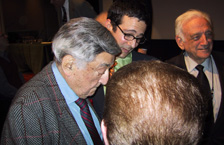 "You're a nice Jewish boy...why don't you go to medical school?"
"You're a nice Jewish boy...why don't you go to medical school?"
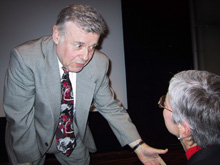 "No,
I don't think you have a Boston accent at all!"
"No,
I don't think you have a Boston accent at all!"
When it was over, the Ingalls and Hoffmans went around the corner for dinner to an excellent French bistro, Pascalou.
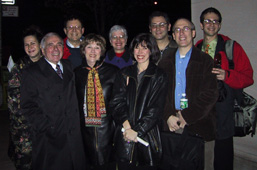 ..
..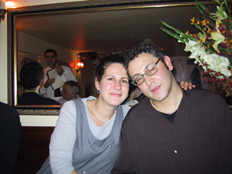 ..
..
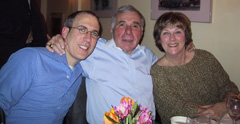 ..
..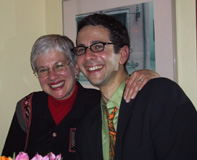
It was a good night.